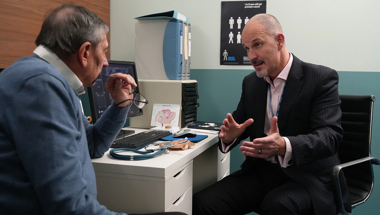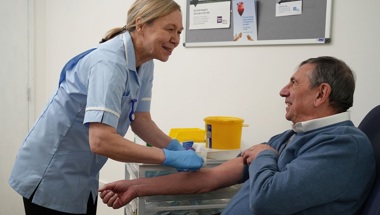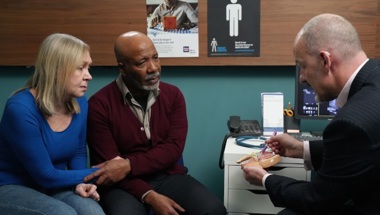Campaigns
17 Jun 2025What will changes to the health system in England mean for men with prostate cancer?
The Government has set out its vision to build an NHS that’s “fit for the future” and is due to unveil a new 10-year plan for the health service this summer. Our Policy & Health Influencing Manager, Essie Mac Eyeson, explains what these changes might mean for men with prostate cancer.

Right now, health services in England are in a state of flux.
Previous governments have acknowledged that our NHS faces major challenges – due in part to staffing pressures, health inequalities and an ageing population as well as the impact of Covid-19.
The current government says it wants to build “an NHS that’s fit for the future”. And we’re now seeing this vision take shape, with the news that NHS England will be abolished in favour of more front-line staff and services.
It’s also been announced that Integrated Care Boards (ICBs) – which develop and commission health and care services in England – will have to cut 50 per cent of their running costs from October this year.
We haven’t seen such large-scale shifts since 2012 when the coalition government introduced significant changes to the organisation of the health system in England.
The impact of these changes on the system remains unclear. But for men with prostate cancer, it’s vital that hard-fought progress isn’t lost.
ICBs must be supported to continue vital risk awareness work
We know men’s experience of healthcare can vary significantly, depending on factors like ethnicity and affluence. And with its ‘Core20Plus5’ approach, NHS England has played an important role in establishing a framework for addressing these health inequalities as well as improving clinical outcomes in five key areas – including early cancer diagnosis.
This framework is a useful tool that local health systems – like ICBs – can adopt when developing their services. And at Prostate Cancer UK, we’ve been working with ICBs to plan how they can improve early diagnosis of the disease.
We’ve developed campaigns to help raise awareness of prostate cancer risk and bust myths that can delay early detection, including efforts to address health inequalities affecting those men at highest risk.
We’ve also created resources to help healthcare professionals have proactive conversations with their patients and piloted projects that engage men in talking to healthcare professionals about their risk.
To make sure these commitments aren’t lost or deprioritised, ICBs must be supported to continue similar risk awareness work.
The importance of addressing health inequalities
The statistics are all too familiar. When it comes to ethnicity, we know Black men are twice as likely to get prostate cancer and have higher rates of late-stage disease. And there are disparities in terms of social deprivation too, with recent data from the National Prostate Cancer Audit showing that men living in less affluent areas are less likely to get a potentially lifesaving diagnosis than those in more affluent areas.
To address these inequalities, it’s important that ICBs are equipped with the time and resources they need. This is particularly key in the absence of a national screening programme for prostate cancer and the continued use of outdated NHS guidelines that prevent GPs proactively talking to men at highest risk.
Our Faster Fairer Better campaign has highlighted the problems with the current system, which puts the onus on men to know their risk and talk to their GP - which only deepens inequalities by benefiting the more affluent and ‘health literate’.
Better use of data can also help improve health outcomes
It’s not just efforts to raise awareness and tackle inequalities that can make a difference. Better data collection can improve health outcomes too.
NHS England currently holds data from across the health service, which can help policy makers build a picture of prostate cancer diagnosis and care. After NHS England is abolished, it’s vital that this data continues to be available and its quality improved.
We support the recommendations of the Sudlow Review, which call for a co-ordinated and standardised approach to data collection across all four nations of the UK. This data must be broken down by key factors, including ethnicity and prostate cancer grade – and the Government must make sure data continues to play a pivotal role.
Providing the best support to men after a prostate cancer diagnosis
Until recently, GPs in England have been incentivised through a framework that rewards them for improving outcomes for certain groups. For cancer patients, one measure that was used to determine these outcomes was the number of people who received a Cancer Care Review within two years of their diagnosis.
The Cancer Care Review gives people living with cancer the chance to discuss what holistic support they might need. But these reviews are due to be “retired” as part of the upcoming reforms.
The Government must take steps to ensure primary care professionals have all the resources and information they need to provide the right support to people who’ve been diagnosed with cancer – and that this support is provided in a standardised way.
What happens next?
Ministers are expected to unveil a new 10-year plan for the NHS this summer – and it’s likely to outline further significant changes. This long-term vision for the health service will be followed by a cancer plan and the UK’s first men’s health strategy.
Whatever changes come next, it’s essential that we continue the significant progress that’s been made in recent years to improve care and support for men with prostate cancer.
Join our community of supporters today and be the first to hear about our latest campaigns. You can stand with men by signing our petitions, writing to your local MP and helping spread the word on social media.






